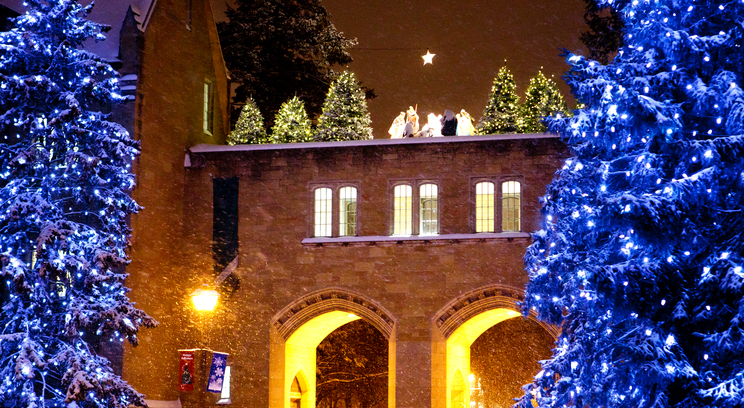
Carol Bruess
“Hey Bruess, you used to write for me,” my kind Scroll editor playfully jabbed me as my husband and I scurried to our seats in Orchestra Hall, the crowd ready for the always-awe-inspiring St. Thomas Christmas Concert. “Maybe something a little Christmas-y?” I assured him, with a healthy two thumbs up, there would be something in his inbox within hours.
Uh oh. What did I just do?
Typically, I wait to pen my Scrolls when something on campus screams “Scroll-worthy!” I’m rarely on campus during sabbatical, so I had a problem. My neur-scroll-ogical wheels had to begin clicking, and fast.
First, I considered the default: Write about holiday rituals! I know a thing or two about the profound place of rituals in our lives, families and culture. I could write about the magic of the Christmas season, which is situated and sustained through a host of symbolically rich rituals. I might provide my perspective and a little research on rituals, defined from a relationship standpoint as those “repetitive communicative enactments that pay homage to a person, relationship, institution or group that is sacred” (E. Goffman). I might describe research on rituals and family – findings that reiterate the highly protective nature of rituals for our families and long-term relationships. Despite whatever hassles or gripes that folks might have about family holiday rituals and traditions, we are well-served to remember that sustaining rituals and traditions – even those that involve jello salad, the grumpy uncle or matching jammies – are among the single best predictors of family health, happiness and a strong sense of identity over generations.
My second holiday Scroll idea: Succinctly summarize the cool research of smart social scientists Mitchell Duke and Robyn Fivush. Perfectly apt for this time of year, they have identified how families that develop a “strong family narrative” by sharing stories of past and present, especially positive ones, are among the happiest and most-resilient families. They even found that kids who score highest on a 20-item measure called the “Do You Know” scale (“Do you know where your grandparents grew up?”) are the emotionally healthiest and happiest kids. I might go on to point out the incredible benefits of developing youth with a strong “intergenerational self,” something no child will have unless we, the adults, take time to give it to them. Over and over again. And such a Scroll, if I were to write it, might point out the obvious: Christmas gatherings are perfect to invest vast amounts of time in good old-fashioned, face-to-face talking and storytelling, especially when there are multiple generations present.
But that Scroll seemed, well, too preachy.
Third option: A simple post urging all of us to take the “e” out of Christmas, as in intentionally reducing our use of “e”lectronics by logging off email, committing to little texting, banishing the tweeting and foregoing constant Facebooking. Instead, what if you gave yourself and your family the gift of being a fully present, non-judgmental listener? I would summarize some of the most shocking research I’ve been reviewing lately: the extent to which almost all families live in an “always on” environment, that most of us never turn off our cellphones. According to recent Pew research, 39 percent of adults report having a symbiotic (“mutual dependence”) relationship with their phones, 25 percent feel they have to answer their cells even when a call interrupts a family meal and 38 percent text or send emails during conversations with their spouse or partner. I could wrap up that Scroll with Barbara Fredrickson’s new research, presented in her book Love 2.0, in which she describes how our biological, social and physiological abilities to experience love – what she calls “micro-moments of positive resonance” – are eroding in a digital age. Such moments absolutely cannot happen unless we are fully physically, psychologically and communicatively present with one another, something most research is suggesting we just aren’t doing as much of nowadays. Oh my.
But, instead of those Scrolls, I settled on simply this short wish for the St. Thomas community and beyond: It is a supreme time, as we acclaim the magic, blessed season of Christ’s birth, to renew our commitment to be kind, loving, patient and engaged humans with the other beautiful people in our homes, communities and families. May each of you, wherever the holidays takes you, receive the gifts of good health, open hearts and a gracious, generous approach to living in the presence of your God, and all others, on this grand earth.







